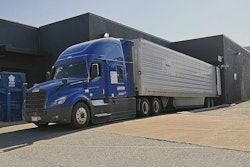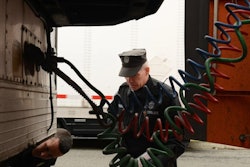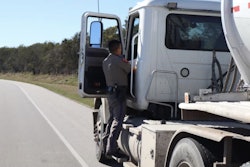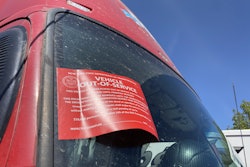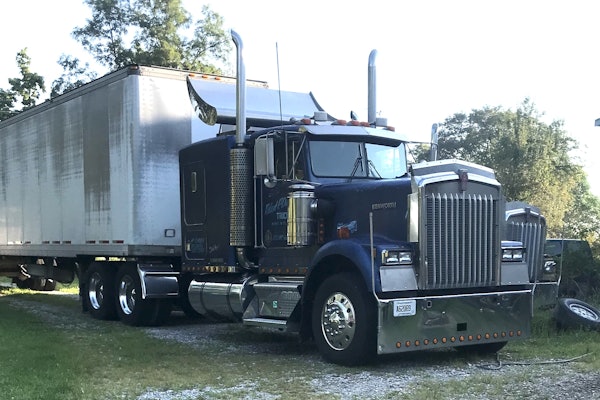Trucking news and briefs for Wednesday, May 7, 2025:
California agrees to officially repeal Advanced Clean Fleets rule
While the California Air Resources Board (CARB) effectively waved the white flag on its Advanced Clean Fleets (ACF) rule in January when it withdrew its request for a waiver with the U.S. Environmental Protection Agency (EPA), court filings reveal that CARB intends to formally repeal the regulation.
The court documents were filed in a lawsuit from a coalition of 17 states, led by Nebraska, and the Nebraska Trucking Association, who sued to block the ACF rule.
California in November 2023 submitted its ACF request to the EPA, which would have required certain fleets of size -- and all port drayage operations -- in the state to transition to zero-emission vehicles beginning last year, and that the entire fleet be fully zero-emissions between 2035 and 2042, depending on a variety of factors. ACF also required all new heavy trucks sold in California be zero-emissions by 2036.
[Related: House votes to repeal emissions CARB waivers for ACT, Low-NOx rules]
According to the court filing, CARB Executive Officer Steven Cliff agreed that CARB staff would present a proposal to repeal the High-Priority Fleet (fleets with $50 million or more in gross annual revenues or operate 50 or more trucks) and the Drayage Fleet requirements of the rule. The proposal will be presented to the Board at a meeting held no later than Oct. 31, 2025. If the repeal is approved, CARB staff will submit that rulemaking action to California’s Office of Administrative Law (OAL) for approval no later than Aug. 31, 2026.

Cliff and California Attorney General Rob Bonta also agreed that “they will not take any enforcement action under the High Priority Fleet or Drayage Requirements for conduct during the period beginning with the earliest effective date of any of these requirements (November 1, 2023) and ending when CARB or OAL ... takes final action on the CARB rulemaking described herein.”
Additionally, Cliff and Bonta will not enforce the ACF’s regulation requiring 100% zero-emission-vehicle sales in the medium- and heavy-duty categories beginning with model year 2036 until CARB obtains a Clean Air Act preemption waiver from EPA for that regulatory requirement.
[Related: Calif. small fleet, advocate: CARB policies don't reflect reality, pushing out independents]
Labor Department reviewing Biden-era independent contractor rule
The U.S. Department of Labor on May 1 issued guidance to its Wage and Hour Division investigators directing them to not apply the Biden-era independent contractor classification rule that was finalized last year while the department reviews the 2024 final rule.
That 2024 rule, which officially took effect on March 11 last year, officially codified, for the first time, the standard that courts have been using for decades up until the Trump Administration’s own independent contractor rule was published in 2021. The Biden DOL repealed the Trump-era rule and put its own rule in place.
[Related: Are leased owner-operators really 'independent contractors'?]
The rule’s applicability to trucking, as reported when it was finalized, is limited, as it only applies to classification for purposes of the Fair Labor Standards Act's requirements for employers, which include minimum wage and overtime. Truck drivers, of course, are exempt from receiving overtime pay, and minimum wage disputes in the industry are rare.
Nonetheless, with its newly-published guidance, the DOL said in a number of pending lawsuits challenging the 2024 rule, it “has taken the position in those lawsuits that it is reconsidering the 2024 Rule, including whether to rescind the regulation.”
DOL investigators, instead of applying the 2024 rule’s analysis in current enforcement matters, are directed to rely on a separate fact sheet for determining an employment relationship. The fact sheet outlines seven factors derived from Supreme Court judgments where the "Court has held that it is the total activity or situation" that should most closely guide contractor determinations. The seven factors the high court has "considered significant":
- The extent to which the services rendered are an integral part of the principal's business.
- The permanency of the relationship.
- The amount of the alleged contractor's investment in facilities and equipment.
- The nature and degree of control by the principal.
- The alleged contractor's opportunities for profit and loss.
- The amount of initiative, judgment, or foresight in open market competition with others required for the success of the claimed independent contractor.
- The degree of independent business organization and operation.
The 2024 rule remains in effect for purposes of private litigation, DOL noted.
[Related: New DOL rule on contractor/employee status under fair-labor law: The legal perspective]
Bipartisan bill would ease veterans’ transition to trucking
Bipartisan legislation introduced in both chambers of Congress is intended to increase military veterans’ access to trucking apprenticeship programs with their U.S. Department of Veterans Affairs (VA) education benefits.
The bill, if passed, would allow the VA to approve programs operated by commercial trucking companies.
The legislation's sponsor, Sen. Bill Cassidy (R-Louisiana), said the legislation would streamline the VA approval process and cut unnecessary red tape that makes it difficult for veterans to participate in apprenticeships that operate across multiple states. The bill was co-sponsored in the Senate by Sen. Richard Blumenthal (D-Connecticut). Companion legislation was introduced in the U.S. House by Reps. Chris Pappas (D-New Hampshire) and Jennifer Kiggans (R-Virginia).
“Veterans deserve support,” Cassidy said. “Many struggle to find work when they come home. Having a commercial driver’s license opens a lot of doors for them.”
According to a press release from Cassidy’s office, trucking companies currently operating in more than one state must get approval from each state to allow veterans to use their VA education benefits for apprenticeship programs with their company. In some cases, these companies have opted out of offering apprenticeships for veterans due to the burdensome red tape required to get more than 20 different approvals.
This bill would allow interstate commercial carriers to get one approval for their apprenticeship programs from the VA, making it easier for veterans to access trucking apprenticeship programs.
[Related: A training suggestion for robust pre-CDL and finishing programs]
Arizona adds public truck parking info online
The Arizona Department of Transportation announced this week it is providing truckers with online real-time information on how many parking spaces are available at Interstate 10 rest areas in western and southeastern Arizona.
The parking information is now available on the Arizona Traveler Information website, az511.gov. It’s part of the Truck Parking Availability System that launched in January with electronic signs alerting truckers to rest area parking spaces ahead. The goal, ADOT said, is helping truckers get the rest they need without having to use places that aren’t designated for truck parking.
The parking information is available through a $2.8 million system that serves the eastbound and westbound Ehrenberg and Bouse Wash rest areas between the Valley and California, and at the Texas Canyon and San Simon rest areas on both directions of I-10 in southeastern Arizona.
Those rest areas feature monitoring systems that track available parking, then that information is supplied to electronic signs, az511.gov and third-party sources used by truck drivers.
[Related: Have you completed your Highway Report Card? Name your worst roads, states]

